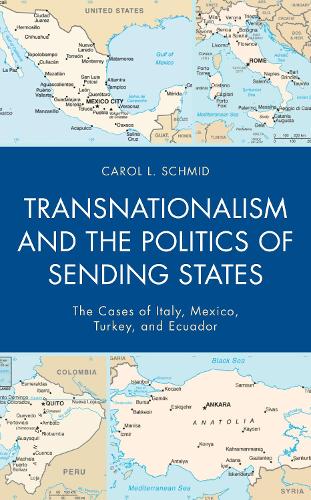
Transnationalism and the Politics of Sending States: The Cases of Italy, Mexico, Turkey, and Ecuador
(Hardback)
Publishing Details
Transnationalism and the Politics of Sending States: The Cases of Italy, Mexico, Turkey, and Ecuador
By (Author) Carol L. Schmid
Bloomsbury Publishing PLC
Lexington Books
16th October 2019
United States
Classifications
Professional and Scholarly
Non Fiction
305.8
Physical Properties
Hardback
160
Width 159mm, Height 240mm, Spine 15mm
372g
Description
Theories on transnationalism are primarily interested in the practices of immigrant populations. Few studies analyze sending states, the perceived state of origin of immigrants, and their attempts to extend beyond state borders to both enrich the emigrant state and bind together the emigrants in comparative perspective. Carol Schmid explores the transnational sending state policies of Italy in the U.S., Mexico in the U.S., Turkey in Germany, and Ecuador in Spain and argues that these sending states are extending their right to govern beyond the territorial confines using similar policies and practices. While all four cases above confer citizenship rights and obligations on their emigrants, depending on the historical conditions and immigrant waves, there is a fundamental conflict between sending and receiving states. This book examines state transnationalism in comparative perspective, specifically the shifting policies and restrictions of sending states in the United States and Europe toward immigrant communities living abroad. This bookfurther analyzes the transnational polarizing policies of Turkey in Germany and Ecuadorian migrants in Spain, where women have led the immigration wave.
Reviews
Carol Schmid's Transnationalism and the Politics of Sending States makes a welcome contribution to the transnationalism literature with a systematic look at the strategies states employ regarding their citizens abroad. There are many worthwhile observations that she painstakingly demonstrates in her book, but I think two particular points deserve a wider readership. The first is that transnationalism is not new--Italy pioneered it in the early part of the 20th century. The second is that regardless of their approach, sending states are limited by host countries especially when their interests do not align. These insights among many others are only possible because of the comparative method she uses and a solid and diverse use of cases. This work will help illuminate wider discussions in political science, sociology, and economics and any scholarship regarding migrants and the extra-territoriality of states.--Luis F. Jimnez, University of Massachusetts Boston
Author Bio
Carol Schmid is professor of sociology at Guilford Technical Community College.
